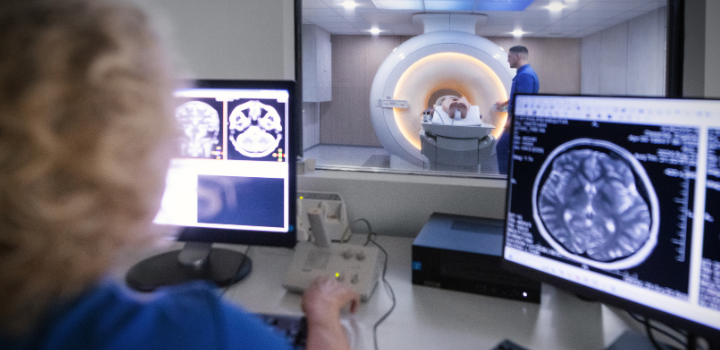New technology ‘game changing’ for pregnant women with diabetes
By: Communications

Automated insulin delivery should be rolled out to pregnant women with type 1 diabetes – according to researchers at the University of East Anglia.
The technology – known as ‘hybrid closed-loop technology’ - gives insulin doses as informed by a smartphone algorithm.
A new study published today shows that the move could help pregnant women better manager their blood sugars compared to traditional insulin pumps or multiple daily injections.
Lead researcher Prof Helen Murphy, from UEA’s Norwich Medical School, said: “Despite better systems for monitoring blood sugars and delivering insulin, altered eating behaviours and hormonal changes during pregnancy, mean that most women struggle to reach the recommended blood sugar targets.
“This means that complications related to having type 1 diabetes during pregnancy are widespread, affecting one in every two new-born babies.
“For the baby, these include premature birth, need for intensive care after birth, and being too large at birth, which increases the lifelong risk of overweight and obesity. Low blood sugars, excess weight gain, and high blood pressure during pregnancy are common amongst mothers.
“We wanted to investigate how automated insulin delivery could help.”
The team trialled a technology known as Hybrid Closed-Loop or Artificial Pancreas. It consists of an algorithm which sits on a smartphone and communicates with the traditional continuous glucose monitoring and insulin pump systems.
The system adjusts insulin doses every 10-12 minutes according to blood sugar levels, meaning that it continuously responds to the persistent changes in blood sugar levels throughout pregnancy.
The team compared this technology with the traditional continuous glucose monitoring and insulin systems, where women supported by specialist diabetes maternity teams, make multiple daily decisions about insulin doses.
The study involved 124 pregnant women with type 1 diabetes aged 18-45 years who managed their condition with daily insulin therapy. Half were randomly allocated to use the Hybrid Closed-Loop technology, and half to use the traditional insulin therapy (insulin pumps or multiple daily injection methods).
The study took place across nine NHS hospitals in England, Scotland, and Northern Ireland and the women took part for approximately 24 weeks (from 10-12 weeks) until the end of pregnancy. It was supported by the Norwich Clinical Trials Unit and the Jaeb Center for Health Research.
On average, pregnant women used the Hybrid Closed-Loop technology for more 95 per cent of the time.
Prof Murphy said: “We found that the technology helped to substantially reduce maternal blood sugars throughout pregnancy.
“This technology is game changing, in that it will allow more women to have safer, healthier, more enjoyable pregnancies, with potential for lifelong benefits for their babies.”
“Compared to traditional insulin therapy methods, women who used the technology spent more time in the target range for pregnancy blood sugar levels - 68 per cent vs 56 per cent, which is equivalent to an additional two-and-a-half to three hours every day throughout pregnancy.
“It was safely initiated during the first trimester, which is a crucially important time for babies’ development.
“The blood sugar levels improved consistently in mothers across of all ages, and regardless of their previous blood sugar levels or previous insulin therapy.
“These improvements were achieved without additional low blood glucose events, and without additional insulin,” she added.
The team also found that women using the technology also gained 3.5 kg (equal to 7.7 lbs) less weight and were less likely to have blood pressure complications during pregnancy.
Importantly, women using the technology also had fewer antenatal clinic appointments, and fewer out-of-hours calls with maternity clinic teams, suggesting that this technology could also be time saving for pregnant women and for stretched maternity services.
“For a long time, there has been limited progress in improving blood sugars for women with type 1 diabetes, so we’re really excited that our study offers a new option to help pregnant women manage their diabetes,” said Prof Murphy.
“We know that for women with type 1 diabetes, unborn babies are exquisitely sensitive to small rises in blood sugars, so keeping blood sugar levels within the normal range during pregnancy is crucial to reduce risks for the mother and child.
“Previous studies have confirmed that every extra hour spent in the blood sugar target range reduces the risks of premature birth, being too large at birth and need for admission to neonatal intensive care unit.
The researchers note some limitations, including that the current study was too small for a detailed examination of baby health outcomes, and that their results are specific to the CamAPS technology, so cannot be extrapolated to closed-loop systems, with higher blood sugar targets, that may not be applicable for use during pregnancy.
The study was funded by the Efficacy and Mechanism Evaluation (EME) Program, an MRC and NIHR partnership and supported by the Juvenile Diabetes Research Foundation (JDRF), and the Diabetes Research & Wellness Foundation (DRWF).
The views expressed in this publication are those of the authors and not necessarily those of the Medical Research Council (MRC), National Institute for Health and Care Research (NIHR), or the Department of Health and Social Care.
The study was led by UEA in collaboration with researchers from the Norfolk and Norwich University Hospitals NHS Foundation Trust, Cambridge University Hospitals NHS Foundation Trust, the University of Cambridge, the University of Leeds, the University of Glasgow, King’s College Hospital NHS Foundation Trust, London, the Royal Victoria Hospital, Belfast, Barnard Health Research, Southampton, the University of Edinburgh and the Jaeb Center for Health Research, Florida.
‘Hybrid Closed-Loop technology improved maternal glucose levels during pregnancy complicated by type 1 diabetes’ is published in The New England Journal of Medicine and presented at the European Association for the Study of Diabetes (EASD) meeting.
Related Articles

UEA launches study after supplement shows promise in professional racing drivers
Researchers at the University of East Anglia (UEA) are launching a new study to see whether American ginseng extract could boost brain health.
Read more
UEA to receive share of £15 million funding boost for region
University of East Anglia researchers have been awarded a share of £15.3 million to tackle real-world health and care challenges across the region and beyond.
Read more
MRI scan breakthrough could spare thousands of heart patients from risky invasive tests
Doctors may soon be able to tell just how sick a heart failure patient really is by using a routine MRI scan, thanks to new research from the University of East Anglia (UEA).
Read more